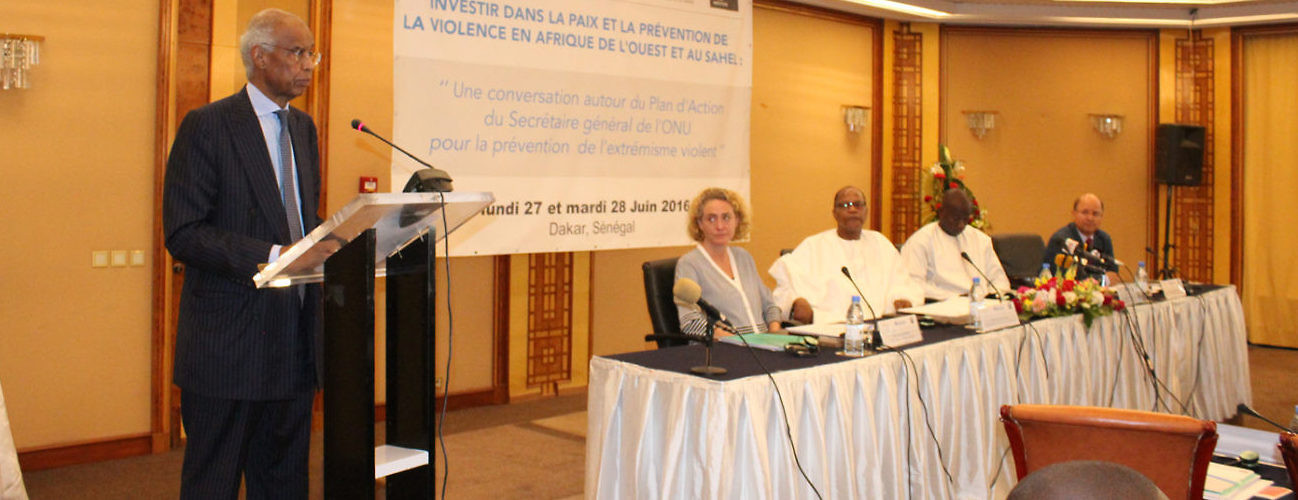Policies to combat terrorism cannot take an exclusively security-based focus, experts at a recent IPI conference agreed. This is the approach efforts made to solve the problem of violent extremism have taken for nearly a decade, and as continued violence illustrates, these policies have been insufficient.
Recognizing that violent extremism manifests itself differently in different contexts, 60 participants from 14 different countries representing governments, regional organizations, the UN, local NGOs and civil society gathered in Dakar, Senegal to discuss the perceptions and nature of the phenomenon in West Africa and the Sahel-Sahara region. The group also aimed to draw practical lessons from factors associated with peaceful and resilient societies in the region.
Youssef Mahmoud, IPI Senior Adviser, told a conference working group that unless the crisis in state-society relations is addressed, violent extremism in the region would continue. “Social, economic and political inclusion is the prime mechanism in the prevention of violent extremism and in consolidation long-term peace,” he said.
Additional working groups during the two-day seminar focused on the role of independent and responsible media coverage, and sub-regional approaches to prevention beyond national borders.
Mohamed Ibn Chambas, the Special Representative of the Secretary-General to the United Nations for West Africa and the Sahel, said it was key to take the socio-economic challenges facing the region and its rapid demographic growth into account. “Proactive and responsible policies, integrating the individual as an actor of development, must be a cornerstone in the economic actions and plans of states in the region in order to ensure sustainable development and an equitable access to resources,” he said. A key demographic to bring into the policy planning will be the continent’s young people. This “youth bulge” will become the African majority by 2025–65% of the region’s 430 million inhabitants will be under 25 years old.
The conference built on discussions IPI, the International Organization of la Francophonie and Centre 4S, convened in Tunis last year on strategies of prevention of violent extremism in the francophone space. That session also aimed to develop a regional perspective on implementing the UN Secretary General’s Prevention of Violent Extremism Plan (A/70/674). Participants examined how the UN and its partners can best support national governments and authorities and local communities to reduce violence.
The conference was co-organized with the United Nations Office for West Africa and the Sahel (UNOWAS), and the Federal Department of Foreign Affairs of Switzerland (DFAE).
Read more in the joint press communiqué issued.
A meeting note in French (with executive summary in English) will follow.
Related coverage:
INITIATIVE Lutte contre l’extrémisme violent en Afrique de l’Ouest et au Sahel : L’Onu appelle les Etats à investir sur la prévention (lequotidien.sn, 28 June 2016)
Communiqué de presse conjoint : Une Rencontre de Haut Niveau pour Investir dans la Paix et la Prévention de la Violence en Afrique de l’Ouest et au Sahel ( humanitariannews.org , 29 June 2016)
Lutte contre l’extrémisme en Afrique de l’Ouest et dans le Sahel : L’Onu pour un investissement accru dans le développement humain (lesoleil.sn, 28 June 2016)
Sénégal: Rencontre internationale sur la prévention de la violence en Afrique de l’Ouest (Afriquinfos, 28 June 2016)
Dakar: Chambas insists on strategic investment to stave off extremism (Afriquinfos, 27 June 2016)
Afrique de l’Ouest : Un terreau fertile pour les djihadistes (dakaractu, 28 June 2016)








